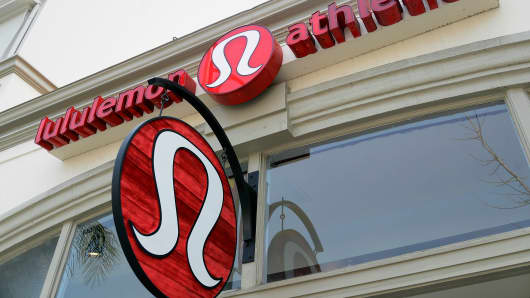Yogawear chain Lululemon Athletica said on Thursday it could lose up to $40 million in profit this fiscal year because of its decision to pull defective workout pants from its shelves.
Despite the profit warning, Lululemon's shares rebounded slightly from a sharp decline earlier this week, when the company said it had discovered some of its signature stretchy pants were too easy to see through and customers could return them for refund. It said there would be product shortages as a result.
Investors may have feared worse damage and may have been reassured by Lululemon's report of a fourth-quarter profit that was slightly higher than it had forecast.
"I think it's relief about the magnitude of the potential impact," said Credit Suisse analyst Christian Buss on the stock move. "If we strip away this recall, the core business is still healthy, and we have a validation of that with these results."
Chief Financial Officer John Currie said the company would probably feel much of the recall's impact in the second quarter, from May to July, when sales in established stores will show little change or grow by a percentage in the "very low single digits." That's a sharp slowdown from a year earlier, when same-store sales rose 15 percent.
"This has been a challenging time for all of us," Chief Executive Christine Day said on a conference call with analysts and investors, adding later that her team was "devastated" by what had happened.
Lost revenue, a writedown of the recalled goods and other costs will reduce earnings by 11 cents to 12 cents a share in the current quarter, the company said, and between 25 cents and 27 cents a share for the full year.
Reaching for Quality
The defective pants, the second quality issue disclosed by the company in less than a year, could also undermine Lulu's reputation for selling workout clothes that last for years. In July, the company said it was working on problems with dye bleeding from some bright garments.
Day said Lulu is rethinking how it tests products: "The truth of the matter is the only way you can actually test for the issue is to put the pants on and bend over," she said.
Lululemon has a team on site with its suppliers, working to find the cause of the problem, she said, adding that it had recently "added strong leadership" in quality control.
Day stopped short of blaming suppliers, and said problems could have arisen at any of four manufacturing stages, involving multiple vendors. She also said the mistake could have been Lululemon's, in something related to a new pattern, for example.
Credit Suisse's Buss questioned Lulu's communications strategy. He noted that the company has not posted the recall on its Facebook page or on the front page of its web store, and said it does not seem to be reaching out to fan sites that track its product launches.
"The big risk here is that they alienate their core customer, and I'm clearly not a crisis management expert, but this seems somewhat lacking," he said.




